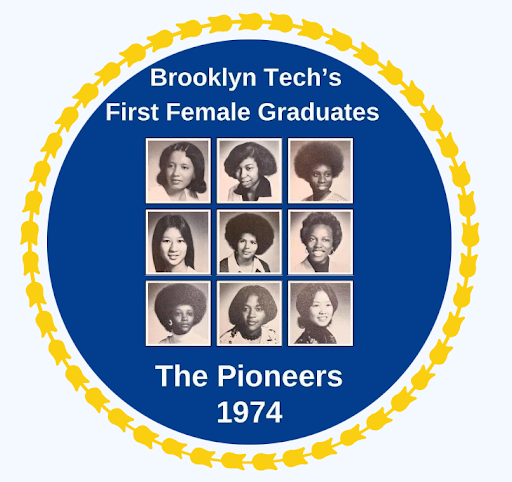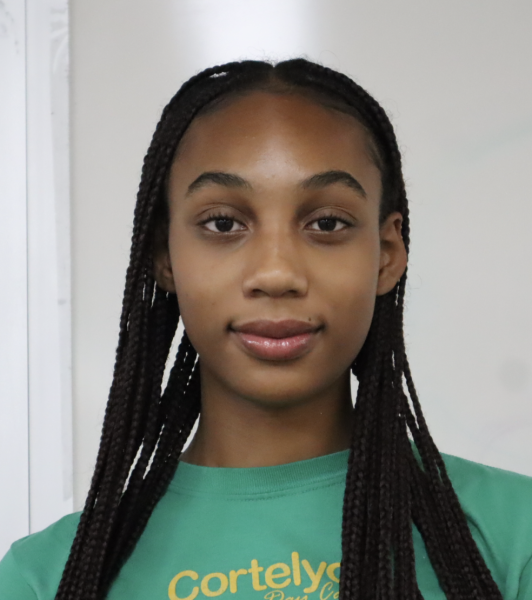In September of 1970, nine new freshmen arrived at Brooklyn Tech. In a sea of thousands of new peers, they had to navigate the school not just as students, but as Tech’s first history-making female students.
The first female students at Tech serve as an example for current and future female students. College Prep major Angela Belcher Epps (‘74) said that during her time at Tech in the ’70s, as a female student, “[She] found [herself] in the lay of the land, and rose to that occasion.” These nine women made up a remarkably small part of the Tech population at the time, but did not let this faze their attitude towards their education.
The women in the class of 1974 mentioned that they never felt isolated. That period of their lives was filled with much social growth, due to the new dynamics introduced by their presence as female students. While adjusting to high school as normal teenagers, they learned how to navigate in male-dominated spaces by supporting each other and providing mutual female solidarity.
“We were new to them, and they were new to us,” said College Prep major Tess Snipes (‘74).
Belcher Epps noted that the experiences of her female classmates were dependent on the people they encountered and their personal biases.
“There were guys who ignored us, and there were guys who supported us,” she explained.
Tech has become more gender balanced since then, with a ratio today of 57% male and 43% female, but female students still face inequality. As a STEM school, Tech’s mission has always been to prepare students to enter male-dominated fields where barriers for women remain.
“There was [influence of] the patriarchy of course, because of the sciences having been so dominated by men,” said Belcher Epps.
This gender disparity has caused many female students to feel alienated in the classroom, especially in majors where male students are an outsized majority.
Software Engineering major Fatoumata Barry (‘25) noted that there were only five girls in her classes for Software Engineering in her junior year, and three and seven, respectively, in her senior year major classes of roughly 30 students each.
“Last year, in my classes, I only had [AP Computer Science A] and that class had three girls, including me,” said Sydney Deb (‘25), also in the Software Engineering major. There are only five girls in Deb’s major classes this year.
While Barry and Deb believe that, overall, Tech does not have an especially sexist culture, classroom environments with a pronounced gender imbalance do allow sexist comments to be taken less seriously.
“Boys were just pointing out, like girls in groups, ‘Oh, the only reason why you’re in here is because you look pretty,’ making their experience and what they do seem small and inferior,” Barry noted of her major classes.
In the Aerospace Engineering major, there have been accounts of sexist harassment so significant that students had to be separated, causing some female students to feel further isolated in a section that included only two girls, and the other section containing only seven.
Even students who are not overtly sexist can feed into a sexist environment. Deb mentioned that many male students also subconsciously assume she is less well-versed in programming knowledge.
“Before even getting to speak to me, just because, you know, I’m a girl, they just assume that I know much less than they do,” she said.
Aerospace Engineering major Phia Vilton (‘25) highlighted how, after work is completed, female students’ contributions can be similarly undercut. She mentioned that her male counterparts are “not trusting you to complete certain parts of the work, or not really giving you any credit for the work that you did.” With her contributions minimized despite the effort she has put into her classwork, she feels that male students in these spaces “aren’t actually basing [their] assessment of [her] on what’s happening in the classroom.”
Vilton said that her experience in her major classes has deterred her from wanting to study aerospace engineering in college.
“You sort of, like, just take a step back and think, like, these are the kind of people I’ll be around for a while,” she said, discouraged that she has to weigh the effects of this environment on her mental health against her passion for the subject.
However, such experiences have also motivated female students to be more make strides in STEM fields. Barry said she has “realized that being in a male-dominated classroom or a male-dominated workforce, it just means that I have more room to show out and just be better than them.”
While a more gender balanced learning environment would be ideal, students like Barry view their educational journeys as paving the way for future Tech students and female students in these careers in general.
Deb remarked that having female teachers has influenced her commitment to software engineering as well.
“[My female teachers] show that it is possible to succeed in a male-dominated field,” she said. “And I think they themselves are actually breaking barriers as being female staff in a male-dominated major.”
Tech has come a long way since 1970, but there is still work to be done. Female students are doing the work, and Tech is producing resilient students who will make way for a more equitable future for the school.









































Deirdre Wilkins • Feb 12, 2025 at 8:27 pm
Wow! Things have not changed that much since I graduated in 1977 as a female Aeronautical Engineering major. Having my work down played and having more points taken off on tests with certain teachers for the same mistake made by my male counterparts was a regular occurrence. Teachers and guidance counselors also tried to dissuade me from starting & continuing with that major. Although I eventually, in college, went in a different direction and got my Bachelors and Masters degree in non-engineering majors, I’m still glad I attended BTHS and graduated with the Aeronautical Engineering degree. I faced additional up hill battles to complete my education and even more in the career of my choice. I’m not sure I would have made it through those battles, had it not been for my time at tech. Don’t give up ladies, you are stronger than you might think. The battle is worth it.